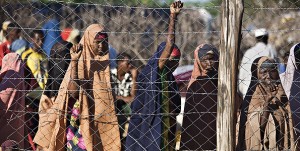Somali government, humanitarian groups voice concerns over Kenya’s crackdown on illegal Somali migrants
 Somali authorities and several humanitarian groups (including Amnesty International and Human Rights Watch) have called on Kenya’s security agencies to review their handling of the ‘Uslama Watch’ operation aimed at curbing the growth of terrorism in the country’s migrant communities.
Somali authorities and several humanitarian groups (including Amnesty International and Human Rights Watch) have called on Kenya’s security agencies to review their handling of the ‘Uslama Watch’ operation aimed at curbing the growth of terrorism in the country’s migrant communities.
Since the operation began on April 2nd, more than 4,000 people have been taken into custody as officers continue to arbitrarily arrest migrants with and without their legally required identification documents, according to online sources.
Reports indicate police officers have also apprehended minors, demanded bribes from the refugees and confiscated the ID’s of some of them.
Humanitarian groups have noted that the actions of the Kenyan government violates both the country’s laws and international guidelines regarding the treatment of refugees.
The deputy regional director of Amnesty International’s Africa Programme, Michelle Kagari, said that the “Somali refugees and asylum-seekers are in an impossible situation: they face arrest and deportation because they are not registered, but it is extremely difficult for them to register.”
The organization went on to reveal that Kenyan authorities have cut down on the registration of refugees and asylum seekers since 2011. Reports indicate that the Kenyan government had temporarily ceased any registration of Somali migrants in 2012 and 2013, reportedly due to concerns over the growing insecurity among Somali migrant communities. However, it is unclear if the process had been reactivated before this exercise.
In a recent report on the crisis, Human Rights Watch has noted that these actions of the Kenyan government is a flagrant violation of the United Nations High Commissioner for Refugees’ (UNHCR) guidelines for treating Somalis fleeing the prolonged war in their country.
Gerry Simpson, a senior refugee researcher at the organization is quoted explaining that “Kenya’s deportation of Somalis to their conflict-ridden country without allowing them to seek asylum would be a flagrant breach of its legal obligations.”
He also notes that “Scapegoating and abusing Somalis for heinous attacks by unknown people is not going to protect Kenyans, Somalis, or anyone else against more attacks.”
Several online commentators have also questioned the reasoning behind the deportation of the asylum seekers back to the heart of the conflict – where there is a high probability of them being recruited into al Shabab.
Reports indicate that about 82 refugees were deported last week after Kenyan authorities discovered they had been in the country illegally.
UNHCR deputy representative for Kenya, Abel Mblinyi, in a recent statement, highlighted the fact that “Deportation of those who are granted asylum and those who seek asylum without following due process of law may amount to serious violation of refugee law.”
He went on to note that the the UNHCR’s office in Mogadishu is in contact with the deported persons.
Meanwhile, the Somali government has asked Kenya to stop the mass arrest of Somalis.
A report by Raxanreeb quotes the Somali deputy prime minister, Ridwan Hersi, disclosing that “Somalia asked Kenya to change the nature of its operation in Nairobi, and refrain any hatred action against Somali citizens living in Kenya.”
The report further reveals that some Somalis born in Kenya were among the group deported recently.
Many reports have alleged that the asylum seekers are being held in deplorable conditions in overcrowded cells and make shift holding centers across the nation. However, officials insist that plans have been made for the welfare of the people in custody.
On Saturday, after Inspector General David Kimaiyo led the Ambassadors of the United Kingdom, the United States, Tanzania and Uganda to the Kasarani Safaricom Stadium to assess the conditions of the people in detention there, he told the press that “These people are being treated in a humane way and even us we observe the human rights. I personally feel very bad when I see an officer molesting or mishandling another person.”
Kimaiyo further directed the asylum seekers to report any abuses they sustain from his officers to the relevant authorities.
The controversial door-to-door search for migrants without proper ID documents is reportedly in response to the rise in terrorist attacks on Kenya, linked to the Somali-based terrorist group, al Shabab.
Photo/Daily Nation.